Past Events
Courses
SIMPLE-G Short Courses
- 2024 Multi-Scale Analysis of Sustainability SIMPLE-G Short Course (April 1 - May 3, 2024)
- The 2024 SIMPLE-G Short Course was held at Purdue University. Nineteen participants from the US, Europe, Australia, China, and Brazil completed four weeks of online learning, followed by one week of in-person training to learn the SIMPLE and SIMPLE-G models. SIMPLE-G is a multi-scale framework used for evaluation of sustainability policies in a global context while factoring in local heterogeneity in land and water resources, as well as natural ecosystem services.
- 2022 Multi-Scale Analysis of Sustainability SIMPLE-G Short Course (April 4 - May 6, 2022)
- The 2022 SIMPLE-G Short Course was held at Purdue University. Thirteen participants from the US, Europe, Australia, and Brazil completed four weeks of online learning, followed by one week of in-person training to learn the SIMPLE and SIMPLE-G models. SIMPLE-G is a multi-scale framework used for evaluation of sustainability policies in a global context while factoring in local heterogeneity in land and water resources, as well as natural ecosystem services.
Workshops
- Understanding Climate Impacts on 21st Century Crop Yield from the GGCMI Network (June 18, 2024) Presentation Files
- Recently the Global Gridded Crop Model Intercomparison (GGCMI – a GLASSNET network member) has published a paper documenting their latest findings about crop yield impacts of climate changes over the 21st century: Nature.com. Through the updated ‘AgMIP tool’ on the GeoHub, GLASSNET has made these results, along with a convenient aggregation tool, available to the community. The new results are quite different from earlier crop impacts and this workshop will assemble lead authors of the paper, the AgMIP tool, and users of these results to discuss the implications for integrated assessments of climate change. The three discussants will bring diverse perspectives on these new findings, as well as discussing their implications for GLASSNET related research.

-
GLASSNET SDG Workshop: Quantitative Modelling of Sustainable Development Pathways (March 22, 2024) Presentation Files
-
The Sustainable Development Goals (SDGs) are a call for action by all countries – poor, rich and middle-income – to promote prosperity while protecting the planet. They recognize that ending poverty must go hand-in-hand with strategies that build economic growth and address a range of social needs including education, health, social protection, and job opportunities, while tackling climate change and environmental protection. In this workshop, you will hear from leading researchers at the Potsdam Institute for Climate Change Research (PIK) about their efforts to quantify sustainable pathways for the food and land systems in an attempt to meet the SDGs.
-
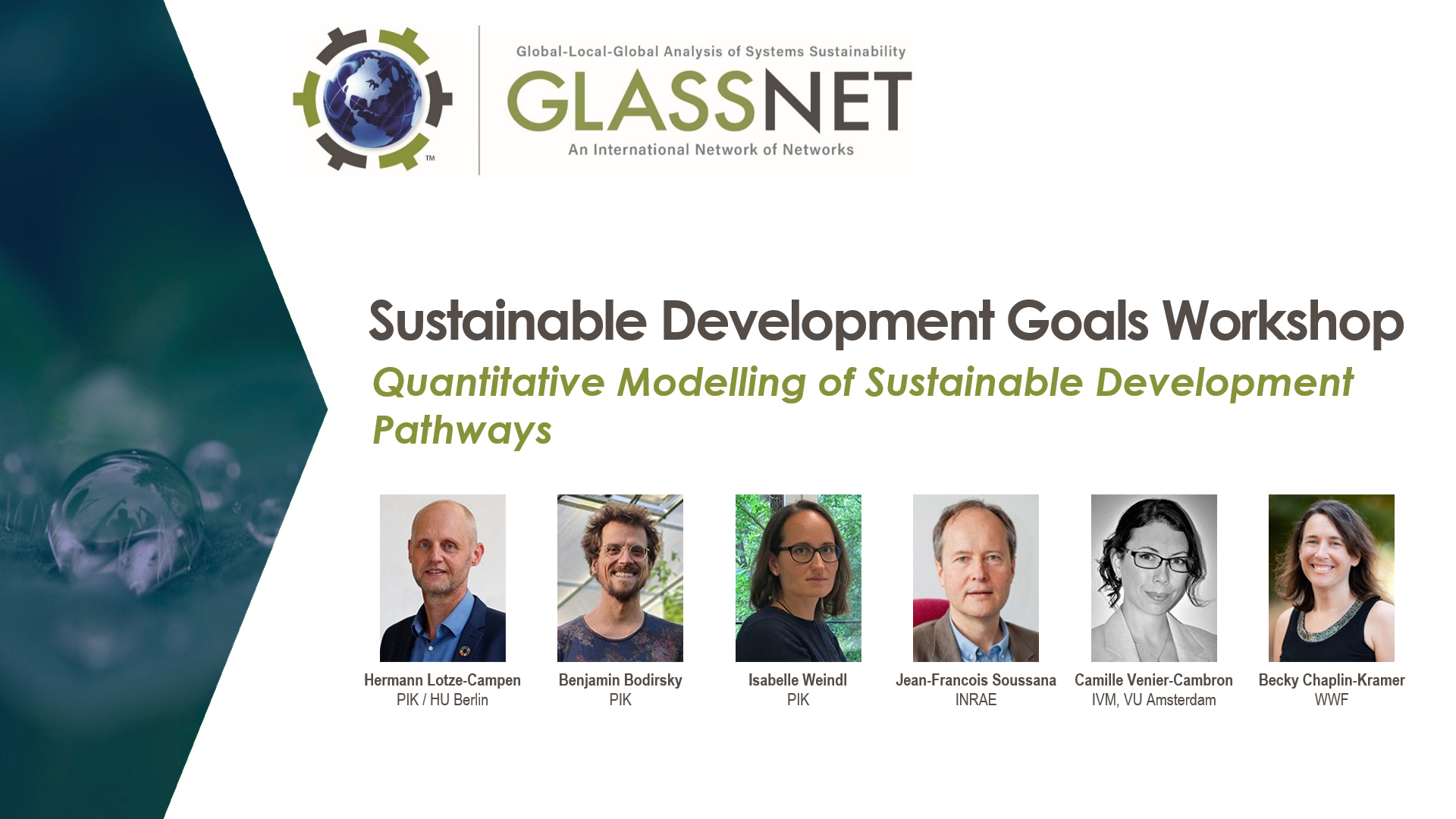
Early Career Researcher Workshops
-
GLASSNET ECR Workshop: What is a "network of networks" and how can you optimize it for your development as an early career researcher? (September 18, 2024) Presentation Files
-
This workshop is part of a series of GLASSNET workshops aimed at equipping early career researchers (ECRs) with the skills and mindset necessary for navigating the dynamic and interconnected world of contemporary scientific research. During this workshop speakers will clarify what a "network of networks" is, and how it differs from, and expands on, singular networks. The workshop will also discuss the advantages of being involved in a "networks of networks" to early career researchers, PhD students, and marginalized groups.
-

-
GLASSNET ECR Workshop: Navigating Transdisciplinary and Transnational Research in the Food-Land-Water-Energy Nexus (March 20, 2024)
-
This workshop is the first in a series of GLASSNET workshops aimed at equipping early career researchers with the skills and mindset necessary for navigating the dynamic and interconnected world of contemporary scientific research. This session delves into the pivotal role of transdisciplinary and transnational research, encouraging young scholars to embrace a broader perspective in shaping their research endeavors. Three speakers will discuss how they have incorporated interdisciplinary, international dimensions into their research. Using diverse methods such as modelling, spatial analysis and empirical research, these speakers will present their experiences of navigating the inter-relationships between food-land-water-energy topics.
-
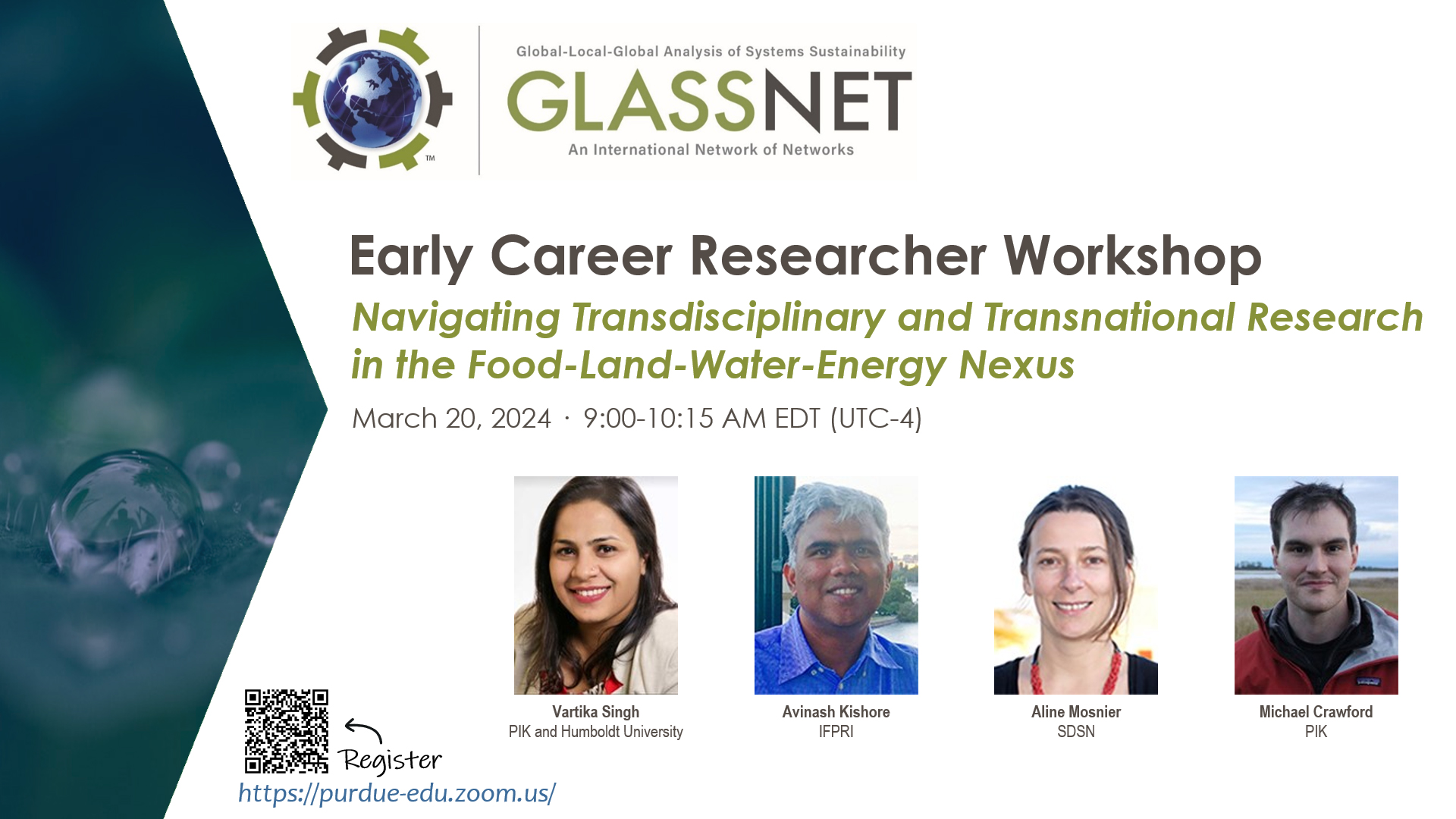
-
Workshop 3: GLASSNET Early Career Researcher Project Launch Award Workshop (April, 5, 2023) Presentation Files
-
As a network of researchers, GLASSNET can help connect researchers with diverse expertise across a wide range of disciplines, data holdings, and experience. These connections help researchers more quickly tackle the interdisciplinary challenges that arise in SDG research. In 2022, we held several Use Case workshops in which experienced researchers presented and received feedback on their ongoing SDG research. Now, GLASSNET will help launch new policy-relevant SDG research by supporting early career researchers (ECR) as they embark on new research endeavors. First, we are asking the GLASSNET community to gather for an online workshop to collectively define the selection criteria for this new ECR Project Launch Award. The award allows for up to USD $6,000 in travel funds, which can be international between US and non-US researchers, or domestic between US researchers.



-
- Workshop 2: Developing Successful Interdisciplinary Research (November 7, 2022) Presentation Files
- Interdisciplinary research collaborations hold great promises for disentangling the complex sustainability challenges facing the world today. What knowledge and practices foster innovative and effective interdisciplinary endeavors? How can one best to empower present and future generations of interdisciplinary researchers? This workshop invited early career scholars to engage with a panel of experts who shared their experience and practical advice on the leadership of interdisciplinary research projects, as well as discussing opportunities and challenges. (Purdue University).
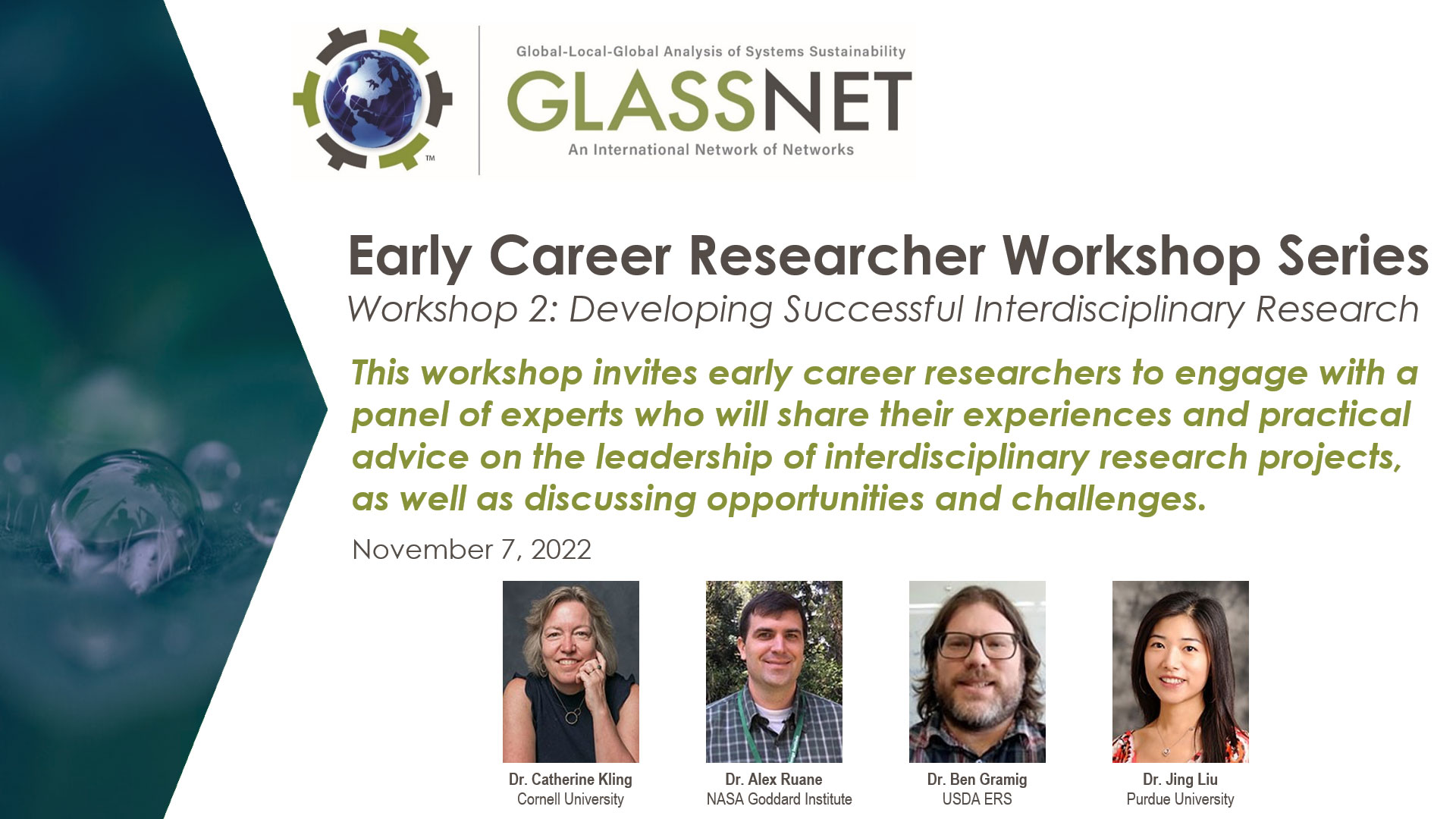
- Workshop 1: Proposal Success (September 21, 2022) Presentation Files
- Obtaining funding is an essential part of academic work for most researchers. In the first of three workshops, Proposal Success, we heard from a panel of experts on how to obtain funding for research that is interdisciplinary, international, and inclusive. The speakers were Dr. Karen Fisher-Vanden (Penn State University), Dr. Nancy Searby (NASA), and Dr. Suzanne Zurn-Brikhimer (Purdue University).
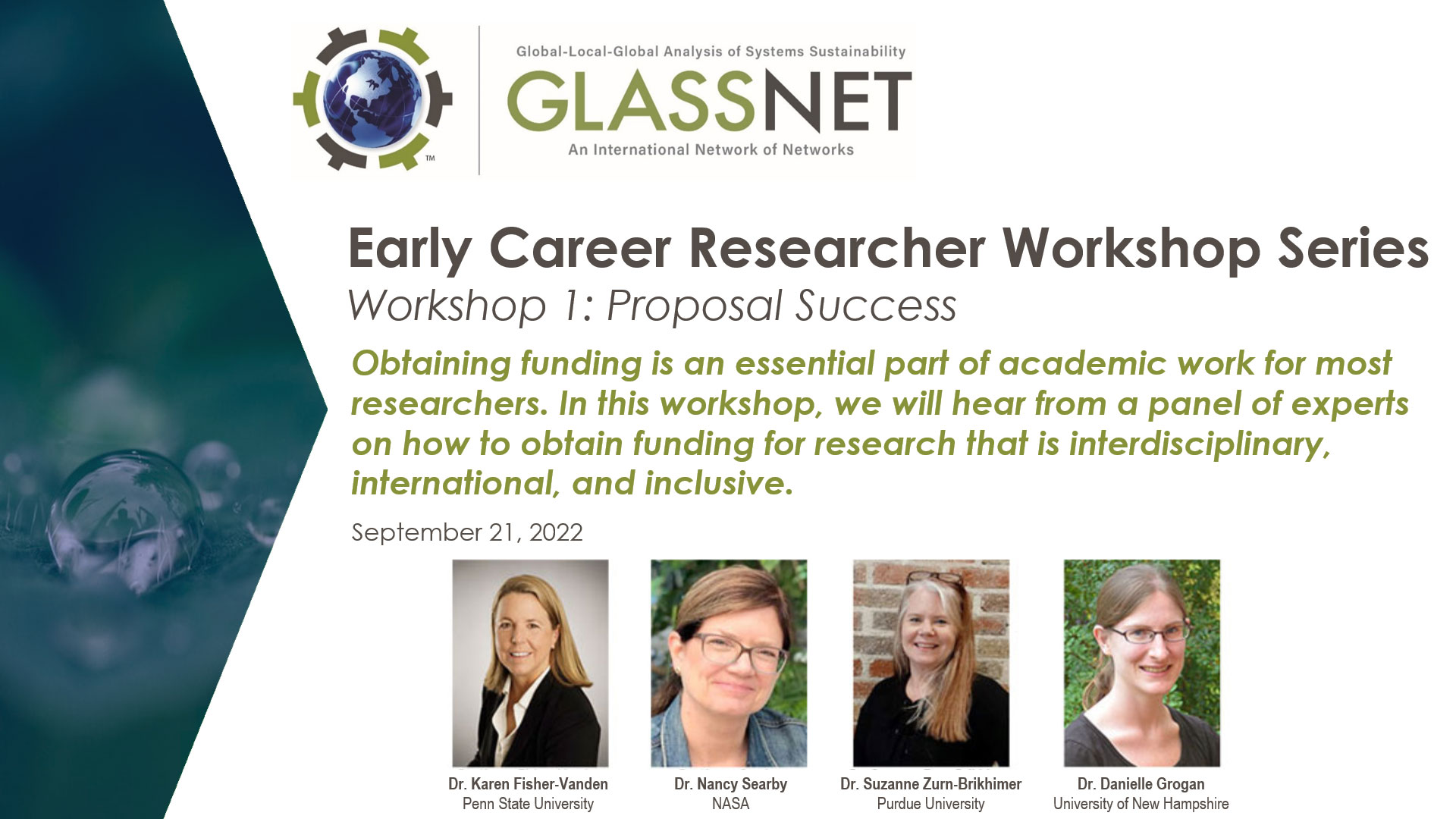
Use Case Workshops
- Spillover effects play key role in maintaining planetary boundaries (September 14, 2023) Presentation Files
- Efforts to stay within interrelated planetary boundaries (PBs) for land and water systems have primarily relied on biophysical modeling, with little consideration for consumer and producer responses and the spillover effects of policies. We argue that these goals cannot be individually addressed due to significant interactions amongst them. For example, policies respecting nitrogen flows may put freshwater and natural lands at risk. This GLASSNET Use Case highlights the importance of preserving multiple planetary boundaries simultaneously and providing synergistic policies and behavioral responses. This workshop will explore a new approach to assessing options for staying within multiple PBs. We combine a global gridded biophysical model with a global gridded economic modeling system. This will allow us to track the spillover effects of policies to maintain one PB on other PBs. Then we present the results of how policies aimed at one PB (nitrogen flows) may compromise others (freshwater use) due to economic spillover effects.
- Assessing the Interaction Between Global Economy, Biodiversity, and Ecosystems Services (September 7, 2023)
- Assessing the interaction between the global economy and biodiversity and ecosystem services (BES) is crucial for sustainable development, especially with increasing global population, economic growth, and changing climate. The global economy depends on BES, and their depletion can lead to significant economic, social, and environmental costs. However, the current economic system and associated policies often overlook the value of BES, leading to unsustainable practices that harm the planet's natural systems. Recent work has linked high-resolution ecosystem service models (InVEST) with versions of the GTAP model that include detailed information on land as an input to production (defined for different Agro-ecological zones, AEZs). This work has led to important publications (Johnson et al., 2020, 2021, 2023), but as of yet, these models have been based on a comparative statics paradigm in which only two points in time are considered (the base year, and some year into the future). Recent work launched by the World Bank under their Changing Wealth of Nations proposal supports new work to combine a recursive-dynamic version of GTAP-AEZ with InVEST and dynamically calculate land-use change. This will allow for more nuanced work that considers questions that require more specificity on when sustainability policies might be passed and when the impacts are felt. In this proposed GLASSNET use case, we propose to strengthen the quantitative rigor of GTAP-InVEST in the new dynamic framework and make it more useful for analyzing global-scale sustainability policies that affect both humans and the environment.
- Land Use Land Cover Change Modeling for Integrated Economic-Environmental Analysis: An Application to the Amazon Region (October 12, 2022) Presentation Files
- The Amazon biome, despite its resilience, is being pushed by unsustainable economic drivers towards an ecological tipping point where restoration to its previous state may no longer possible. This is the result of self-reinforcing interactions between deforestation, climate change and fire. In this paper, we develop scenarios that represent movement towards an Amazon tipping point and strategies to avert one. We assess the economic, natural capital and ecosystem services impacts of these scenarios using the Integrated Economic-Environmental Modeling (IEEM) Platform linked with high resolution spatial land use land cover change and ecosystem services modeling (IEEM+ESM). This paper’s main contributions are developing: (i) a framework for evaluating strategies to avert an Amazon tipping point based on their relative costs, benefits and trade-offs, and; (ii) a first approximation of the economic, natural capital and ecosystem services impacts of movement towards an Amazon tipping point, and evidence to build the economic case for strategies to avert it. We find that a conservative estimate of the cumulative regional cost through 2050 of an Amazon tipping point would be US$256.6 billion in Gross Domestic Product. Policies that would contribute to averting a tipping point, including strongly reducing deforestation, investing in climate-adapted agriculture, and improving fire management, would generate approximately US$339.3 billion in additional wealth. From a public investment perspective, the returns to implementing strategies for averting a tipping point would be US$29.5 billion. Quantifying the costs, benefits and trade-offs of policies to avert a tipping point in a transparent and replicable manner can pave the way for evidence-based approaches to support policy action focusing on the design of regional strategies for the Amazon biome and catalyze global cooperation and financing to enable their implementation.
- Agricultural and forestry investments, land use change and socio-ecological sustainability impacts in Southern and Eastern Africa (August 2, 2022)
- This use case builds on the data and knowledge that we have accumulated across nested scales, from global to pantropical dry forest and woodlands, the Eastern/Southern African region, and Northern Mozambique, to (i) build distinct scenarios of future agricultural and forestry investments in the region, characterized by different types of investors with different assets, goals and logics, and (ii) build on the Bayesian Network model that we developed to turn these investment scenarios into scenarios of land use change at the scale of the region (meso-scale). These scenarios could be further (iii) downscaled within Northern Mozambique to investigate detailed land use change and their impacts. The cross-scale assets on which we can build include in particular (i) a global characterization of frontiers as places with excess agricultural expansion compared to standard land rent predictions (Eigenbrod et al. 2020), (ii) a pan-tropical map and typology of deforestation frontiers covering all dry tropical forests and woodlands (Buchadas et al. under review), a typology of lands into categories of frontiers or more settled regions (Abeygunawardane et al. 2022), (ii) a Bayesian Network model linking investors assets and decision-making logics to probabilities of investing in certain categories of land, and (iii) at the more detailed scale, time series of land use maps for Northern Mozambique (Bey et al. 2021). We will also build on extensive qualitative ethnographic work of investors’ logics and dynamics in the region (Kronenburg García et al. 2021).
- Net Zero Plus - Creating the UK's New Woodlands (June 21, 2022)
- The Net Zero Plus project combines natural and social science to demonstrate how to design afforestation in the UK to store carbon (SDG13) and deliver co-benefits for biodiversity (SDG15), water environments (SDG6) and recreation. The project is unusual in having an extremely close association with those senior policy makers in the UK Government charged with the massive expansion in forestry needed to deliver the greenhouse gas removal element of the Government’s commitment to achieving ‘net zero’ greenhouse gas emissions by 2050. The innovative NZ+ Decision Support Tool being developed by the project will be used by the UK Government to guide that expansion of woodland while also helping landowners, farmers and other decision makers, with advice on the most effective places to create new woodlands (and manage existing woodlands). The NZ+ team is delighted to have the opportunity to be a part of GLASSNET, benefit from its expertise in computable general equilibrium (CGE) modelling and integrate into the GTAP user community. UK afforestation is expected to make use of considerable areas of farmland and this may in turn both change and raise agricultural imports. The production of those imports is likely to increase greenhouse gas emissions abroad. Such offshoring (“leakage”) of carbon emissions could undermine the global effectiveness of greenhouse gas removal in the UK. If emissions for agricultural production abroad are higher than in the UK, woodland creation might even increase global greenhouse gas emissions. Understanding carbon leakage is, thus, vital to the project. Collaborating with GLASSNET and world leading experts at Purdue University, NZ+ will use the GTAP-AEZ-GHG CGE trade model to link land use change in the UK to global greenhouse gas leakage via agricultural and forestry imports incorporating the effect of potential changes in UK diet and food technology as well as the effect of climate change on agricultural yields and tree growth.
Webinars
SIMPLE-G Webinars
- SIMPLE-G Brazil: Transportation Infrastructure Expansion in Brazil (March 20, 2023) Presentation Files
- Using the recently developed SIMPLE-G-Brazil model, we explore how the 2035 National Logistics Plan (PNL2035) can affect Brazil’s agricultural competitiveness and the environment. Results show that the Plan could significantly reduce the cost of transporting central-west produced crops to major exporting ports, but with considerable impacts on local land use change. These changes also generate spatial spillovers to regions outside Cerrado, highlighting the importance of taking into account the market-mediated effects across scales in the analysis.
Conferences
GLASSNET Conferences
- Managing the Global Commons: Sustainable Agriculture and use of the World’s Land and Water Resources (April 7-8, 2022)
- Scientists and policy makers gathered at Purdue University for a conference on Managing the Global Commons: Sustainable Agriculture and the use of the World’s Land and Water Resources to discuss potential solutions to the global sustainability challenges facing agriculture in the 21st century. The conference was hosted by GLASSNET and sponsored by Purdue University’s Provost Committee on Reputational Stewardship and USDA-NIFA. Papers presented at this conference will be published in a special issue of Environmental Research Letters.
2023 Biennial Meeting
The GLASSNET biennial meeting was held at the University of Minnesota on October 1-3, 2023. It involved 30 scientists from the US, Canada and the EU, focusing on achieving the UN Sustainable Development Goals on a planet with limited land and water.
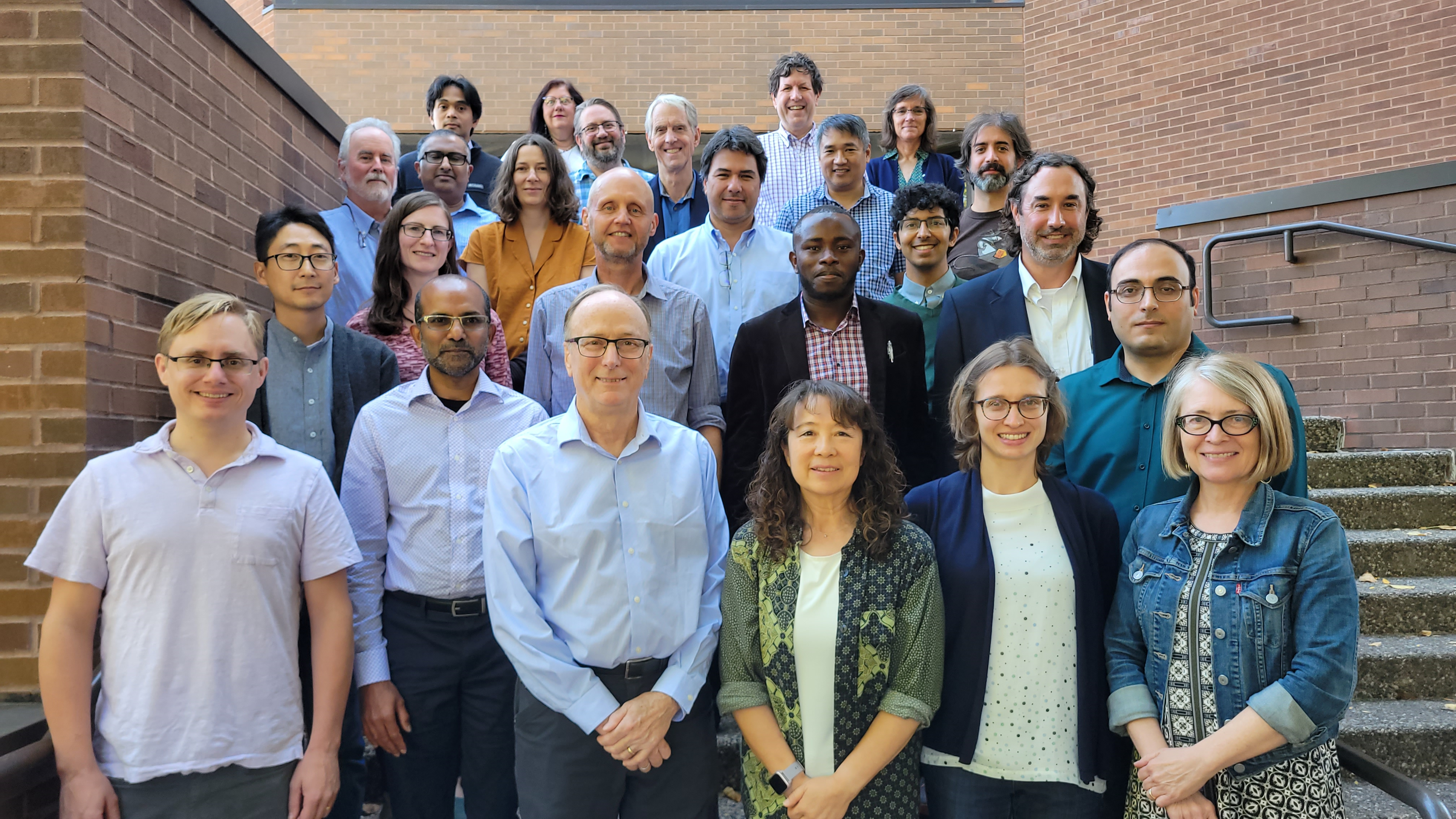
Recent Publications and Talks
- GLASSNET also recently published a special issue of Environmental Research Letters focusing on global-local-global analysis of sustainability, with 13 individual papers and a synthesis by Hertel, Irwin, Polasky and Ramankutty: https://iopscience.iop.org/article/10.1088/1748-9326/acf8da
- Zuidema, Shan, Jing Liu, Maksym G. Chepeliev, David R. Johnson, Uris Lantz C. Baldos, Steve Frolking, Christopher J. Kucharik, Wilfred M. Wollheim, and Thomas W. Hertel. 2023. “US Climate Policy Yields Water Quality Cobenefits in the Mississippi Basin and Gulf of Mexico.” Proceedings of the National Academy of Sciences 120 (43): e2302087120. https://doi.org/10.1073/pnas.2302087120.
- Hertel, Thomas W., Elena Irwin, Stephen Polasky, and Navin Ramankutty. 2023. “Focus on Global–Local–Global Analysis of Sustainability.” Environmental Research Letters 18 (10): 100201. https://doi.org/10.1088/1748-9326/acf8da.
- Liu, Jing, Laura Bowling, Christopher Kucharik, Sadia Jame, Uris Baldos, Larissa Jarvis, Navin Ramankutty, and Thomas Hertel. 2023. “Tackling Policy Leakage and Targeting Hotspots Could Be Key to Addressing the ‘Wicked’ Challenge of Nutrient Pollution from Corn Production in the U.S.” Environmental Research Letters 18 (10): 105002. https://doi.org/10.1088/1748-9326/acf727.
- Lopez-Barrera, E. and T.W. Hertel, (2023) “Solutions to the double burden of malnutrition also generate health and environmental benefits”, Nature Food, (4):616-624. https://doi.org/10.1038/s43016-023-00798-7
- Hertel, Thomas W. “Global and Local Policies for Respecting Planetary Boundaries: Tradeoffs and Synergies”, virtual presentation to the workshop on Integrating Planetary Boundaries in Economic and Social Science Analysis, organized by the Department of Economics, University of Copenhagen, September 15, 2023.
